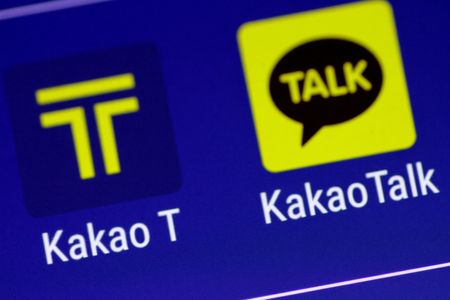By Joyce Lee
SEOUL (Reuters) – Kakao Corp’s co-CEO Namkoong Whon resigned on Wednesday as South Korea’s largest mobile chat app sought to defuse public anger over a massive outage that left tens of millions without access to a wide range of services.
The company has pledged to increase investment to ensure continuity at the data centres it uses amid growing concern about the app’s market dominance in Asia’s fourth-largest economy.
Namkoong’s resignation comes only seven months after he took the top job and leaves co-CEO Hong Euntaek, appointed in July, as sole CEO.
The two apologised for the outage that started on Saturday due to a fire at a data centre run by SK C&C near Seoul, which cut off power to 32,000 servers, or about 30% of Kakao’s total.
“We did not prepare for a complete shutdown of an entire data centre,” Hong said at a press briefing, adding that previous emergency drills had mostly involved contingencies for surges in traffic.
“We will increase infrastructure investment so we can be prepared for shutdown of a data centre or two.”
He noted while there was no loss of data due to back up plans, programmers’ tools had not been backed up.
Most of its systems were restored by Wednesday, but miscellaneous functions remain shaky after disruptions to a wide range of services from payments to taxis and restaurant bookings.
“While Kakao has become a public service that the majority of the public uses, we’ve neglected responsibilities accompanying our status,” Hong said.
‘LIKE WATER OR AIR’
KakaoTalk, launched in 2010, has more than 47 million active accounts in South Korea, making it one of the most ubiquitous apps in the country of 51.6 million.
The free messenger service took mobile users by storm soon after smartphones took off in late 2000s and its early mover advantage allowed it to outpace competitors, including tech giant Naver, to become South Korea’s dominant chat app.
It was later able to leverage its large user base to expand into games, advertising, intellectual property and other entertainment, shopping, payments and mobility.
Hong, who is also leading the company’s response to the outage, said Kakao would look into why service recovery work was slow, review compensation for users and businesses affected by service disruptions and build its own data centres.
Namkoong, whose responsibilities included supervision of data centre operations, will remain in an advisory role to ensure no repeat of the problem.
“As the CEO in charge of the business…all thinking revolved around sales and operating profit. Rather than staying in that role, I recognise the gravity of this situation,” Namkoong said.
“For a tech company, the system is like water or air… as (Kakao) has grown rapidly in recent years, we are reevaluating the need for deeper interest and investment in the area.”
Kakao is investing 460 billion won ($325 million) to build its own data centre from next year, and another one will be completed in the following year, it said.
More than 650 small businesses complained about lost sales due to the Kakao outage, lobby group Korea Federation of Micro Enterprise said.
The ruling party’s policy chief said on Wednesday lawmakers will propose a bill requiring companies like Kakao to back up their systems.
The reshuffle and its biggest ever service disruptions cap a tumultuous year for Kakao.
The group’s billionaire founder Brian Kim quit the board and Namkoong was tapped for the top job in March after controversy involving stock options exercised by some executives at its financial affiliate soon after IPO.
Shares in Kakao rose as much as 5.7% on Wednesday. Kakao shares plunged as much as 9.5% on Monday to their lowest since May 2020, wiping out 2 trillion won ($1.39 billion) in market capitalisation at one point.
($1 = 1,415.6400 won)
(Reporting by Joyce Lee; Writing by Miyoung Kim; Editing by Sam Holmes)

